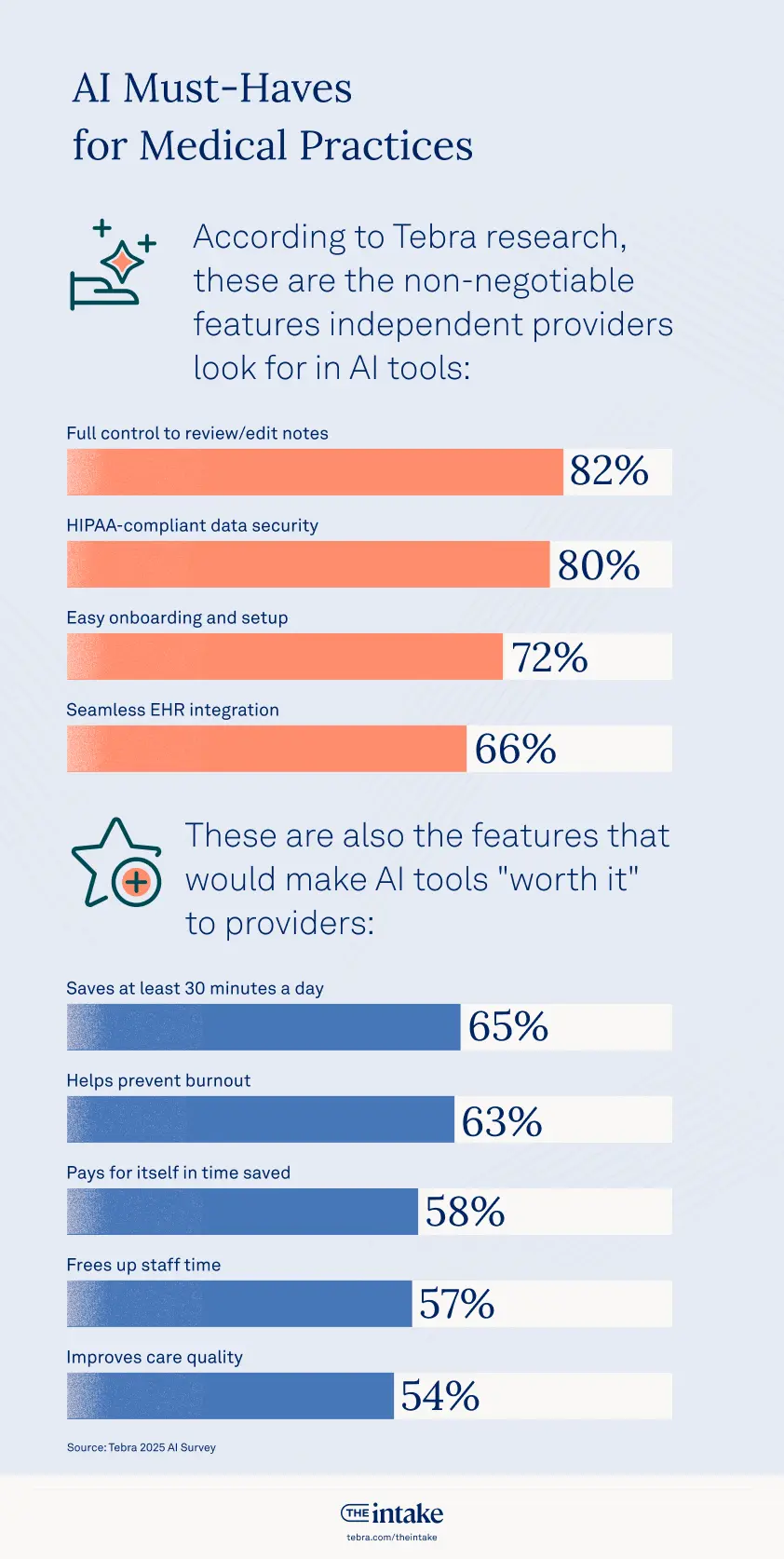Artificial intelligence promises to solve the biggest problems in your private practice: documentation overload, burnout, and too little time with patients. But despite growing interest, most clinicians haven’t yet adopted these new tools.
In a 2025 Tebra survey of 105 providers in small practices across the United States, 63% said they have not used AI. Their hesitation reflects real concerns about education, accuracy, liability, and how fast technology is changing. Before committing, clinicians want solutions that deliver measurable value, safeguard patient privacy, and fit within their existing systems.
The numbers reveal how providers currently spend their time. Repetitive documentation topped the list of workflow frustrations, with 88% of providers calling it their biggest time-waster.
So, what do medical practices need before leaning on AI tools, particularly for the ones they say are eating up their time? The results point to specific features and safeguards that matter most in order to move forward.
The emotional toll of documentation and the AI opportunity
Across the sector, documentation is a source of frustration and fatigue. According to the survey results, 70% of providers said charting takes time away from patient care. And 64% said it contributes to burnout.
When asked how they feel at the end of the day, many respondents used the same word: “exhausted.”
One mental health physician in Illinois put it simply: “Exhausted, ready to go home.” Another, based in California, described how documentation spills into their personal time: “Exhausted, spending time on documentation which should have been spent on my personal use and time such as leisure activities.”
Some providers did express satisfaction when they were caught up on notes. But that feeling was far less common.
“Among current AI users, 51% said it reduced after-hours work, 49% reported more face time with patients, and 46% experienced less stress.”
Top concerns slowing AI adoption
Even as AI tools become more common in healthcare, many clinicians remain cautious. The survey asked providers about the biggest roadblocks. Their responses point to a mix of educational, operational, and financial concerns:
- Lack of education and awareness: 51% say they don’t know how AI works.
- Time constraints: 48% haven’t had time to explore AI options.
- Legal risk and trust: 37% worry about liability while 32% question accuracy.
- Workload compatibility: 34% say tools aren’t designed for their workflows.
- Cost sensitivity: 60% cite cost as a barrier to adoption.
Ultimately, clinicians are open to AI but only if it’s safe, affordable, and easy to understand and use. While these concerns are significant, they aren’t insurmountable. Instead, they provide a clear roadmap for what a trustworthy AI tool needs to deliver. So what does it take to make AI worth it for a private practice?
What makes AI “worth it”: Your practice’s non-negotiables
Before you start to book demos, it’s important to define what success with AI looks like for your practice. Based on what your peers value most, any AI tool that you consider should meet several foundational requirements for day-to-day value and usability:
- Easy onboarding and setup (72%): The tool must be easy to implement and use for your team.
- Seamless EHR integration (66%): It must work within your EHR, not require a new login or process.
- Full control to review/edit notes (82%): Your team must retain final clinical authority on all documentation and be able to review and edit as needed.
- HIPAA-compliant data security (80%): Any tool you implement must fundamentally safeguard patient data and remain in compliance with HIPAA.
- Saves at least 30 minutes a day (65%): Your team must experience a clear return on time to justify the investment.
- Frees up staff time (57%): Your staff, not just your clinicians, should experience time savings as well.
- Improves care quality (54%): The AI tool must improve patient care, and your practice must define the metrics by which you’ll evaluate its success.
At the top of the list was control. Clinicians want the ability to review and edit every note to ensure accuracy, safeguard patient relationships, and protect themselves from legal exposure. Tools that give them that level of oversight are far more likely to earn their confidence.
Where clinicians are open to AI support
Even among AI skeptics, support is strong for automation — especially when it helps with time-consuming and repetitive tasks. The most commonly accepted areas for AI assistance include:
- Clinical tasks: Providers welcome AI assistance with pre-filling documentation templates (63%), drafting visit notes (60%), and flagging chart inconsistencies (48%).
- Administrative tasks: Providers are open to AI handling repetitive administrative work, including appointment scheduling or reminders (65%) and patient intake and registration (46%).
- Medical billing tasks: Providers see AI as a valuable tool for revenue cycle management, including suggesting ICD/CPT codes (62%) and medical billing or claims processing (48%).
- Patient engagement and reputation management: Providers are interested in using AI to manage both patient engagement and reputation, including for sending patients post-visit summaries (40%), tracking online patient reviews (32%), and responding to those reviews (18%).
By starting with tools that support everyday efficiency, practices can gradually build trust in AI. Over time, that familiarity can lead to more integrated use.

What will build confidence: From integration to education
Once you know what your practice needs from AI, it’s time to find a trustworthy partner. Your peers identified several specific elements that build confidence. Use these points as you build a framework with which to evaluate potential AI vendors.
- Ask for an EHR integration demo: 71% of providers say that built-in EHR integration would make them confident in an AI tool, so don’t settle for a slide deck. Ask the vendor to demonstrate how the tool works within your EHR. If it requires a separate login or window juggling, it might create more work.
- Verify privacy and security measures: 62% of providers value privacy and security measures, but every vendor will claim to be secure, so double-check their claim. Ask for their security documentation, inquire about their data encryption methods, and make sure that they’ll sign a business associate agreement that explicitly covers HIPAA compliance.
- Review the review and edit workflow: 61% of providers would be more confident in AI tools if they could review and edit its outputs. Since clinician control is key, ask the vendor to show you the workflow for reviewing, editing, and approving AI-generated text. How easy is it to correct an error or add nuance? The process should feel seamless and leave you in control.
- Ask for proof of performance: 56% of providers want evidence of promised time savings. Ask the vendor for data or case studies from practices that are similar in size and specialty to yours. It should offer you transparent metrics on the tool’s effectiveness for specific tasks.
- Seek peer endorsements: 30% of providers want validation from other clinicians that a tool is a good choice. Ask the vendor for references, or look for genuine reviews and testimonials. Hearing from a peer who has successfully adopted the tool can be a final piece in building confidence.
The final step: Finding an AI partner that meets your criteria
The path to successfully adopting an AI tool in your private practice is paved with valid concerns, but the criteria for success are clear. The right AI tool isn’t just a good piece of software, but a trustworthy partner that enables clinical autonomy, security, and seamless integration.
Finding a vendor that builds its tools around these non-negotiables is the key to unlocking the benefits of AI without adding to your workload. At Tebra, we designed our AI Smart Staff with that in mind — to meet the daily demands of private practice and support you and your staff by taking work off your plate.
Here’s how our AI tools align with what providers like you demand:
- Reclaim your time and control: AI Note Assist turns patient conversations into structured HIPAA-compliant EHR notes so you can walk out the door on time.
- Manage your reputation: AI Review Replies lets you respond to patient reviews quickly with suggested, sentiment-based responses.
- Understand what your patients value: AI Review Insights surfaces trends in feedback so you can identify what matters most to patients.
Together, these tools are already helping practices like yours save time, reduce burnout, and stay connected to patients with ease. Ready to learn more? Schedule a Tebra demo today to see how AI Smart Staff works within your existing workflows, creating space in your routine where you and your patients need it most.
You might also be interested in
- Dr. AI?: Learn how artificial intelligence is transforming the patient-provider dynamic.
- Measuring trust in healthcare and what patients value most: Explore patient preferences from state rankings to AI adoption.
- How do AI tools actually work in practice?: Book a Tebra demo today and experience firsthand how AI tools can support your processes.
- Current Version – Sep 17, 2025Written by: Jean LeeChanges: This article was updated to include the most relevant and up-to-date information available.







